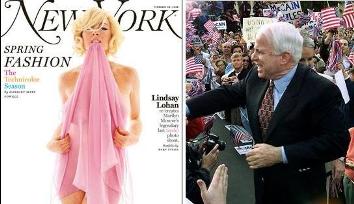MediaBizBuzz for February 25, 2008: Feeding The Media Maw: Balancing Short-Term Headlines Against Long-Term Reputation

Only in an Attention Economy could John McCain and Lindsay Lohan share the same sentence. In a sense, each is the opposite side of the same coin: Comeback and Scandal. Scandal and Comeback. But they are not alone. The past week is a proof that the 24 hour news cycle is manifesting Hobsonian Choices, not only in coverage of politics and entertainment, but also in business and technology. Skeptical? Let's have a closer look.
On January 25th, the editorial board of The Gray Lady endorsed John McCain, enthusing "... [T]here is a choice to be made, and it is an easy one." Yet three weeks later it carried this front-page, above-the-fold headline: For McCain, Self-Confidence on Ethics Poses Its Own Risk, alleging that McCain had an improper and unethical relationship with lobbyist Vicki Iseman. Across the mediascape, the response was immediate and brutal: Where's the Beef? NYU J-school professor Jay Rosen offered a nuanced critique on HuffingtonPost, laying much of the blame at the feet of publisher Arthur Schulzberger, Jr. - a singular figure hovering at the intersection of the editorial board and the Times' reportage. Rosen overlooks the possibility that Schulzberger might be a wee bit preoccupied with Harbinger Capital and Firebrand Partners stalking control of the New York Times Co's board. He does recognize, however, that the paper may have felt the publish or perish vibe with stories coming out later that day in both the Washington Post and The New Republic. Across the ideological divide, the Times still stands upright, but it appears to have temporarily (one hopes) exchanged its currency for frisson. Is it any coincidence that one of its own, Adam Moss, has been striving to catapult New York Magazine from a regional to a national title? Square in the path of this trajectory, its "Last Sitting" redux with barely-out-of-rehab Lindsay Lohan channeling Marilyn is... problematic. Not the kind of transparency we mean when we talk of marketing and privacy.
The Battle for Yahoo! continues as well. Silicon Alley Insider's Henry Blodget is convinced that a Microsoft takeover will be a disaster. In tandem, TechCrunch reports that NewsCorp continues to explore the possibly of creating a new media entity by combining Yahoo! with its Fox Interactive Media properties (principally MySpace and IGN). The Times makes an astute point: Microsoft should take a page from Oracle and make acquisitions out of its core competencies; it should buy SAP -- not Yahoo!
But there's an elephant in the room. A massive pachyderm: Click Fraud. While industry-wide there's an increase of 15%, Click Forensics finds that 1 in 3 clicks on Google and Yahoo!'s Publisher Network are fraud! That's 26 million publishers (according to the Times' Freakonomics blog). Oh, yeah: the recession. SAI's interviews an unnamed Google "insider" to find that the behemoth is vulnerable, if not in the long-term, for the next two quarters. Likewise, Jack Myers looks industry-wide on how an economic downturn will affect the ad spend for 2008.
The Oscars (Best Picture, Director, and Actor were correctly predicted by InTrade.com) and the end of the Writers Strike refocuses our attention not only on programming, but on emerging technology and evolving viewer behavior. Our own Ed Martin makes the (heretical?) case, that TV's inventory trumps that of the current crop of cinematic releases. But is anyone watching (The Wire)? eMarketer looks at a recent IDC study, suggesting that heavy Internet users have doubled their time online at the expense of traditional TV viewing. The article takes these findings with a grain of salt, contrasting them with research from Forrester and USC's Annenberg School. Nielsen directly contradicts an aspect of the IDC study, finding that HD viewers are glued to their plasmas. In its study, ANA captures the perception that marketers hold less stock in television, and are eager to explore new frontiers. Surely, online video is benefiting from this paradigm shift: Avenue A/Razorfish (owned by Microsoft) saw its profits surge 36% last year. While Google has just rolled its AdSense for Video out of beta, Irwin Gotlieb, the eminence gris of media planners, schools BusinessWeekon his risque practice of rebate, or "volume override." Last week Jack Myers hosted a Future of Media panel at The Paley Center for Media in Los Angeles exploring the paradigm shifts that are re-defining audience relationship to content. [A video of the event will be posted later in the week.]
A more holistic view of the way forward is presented by the TED conference, which has been exploring the intersection of technology, entertainment, and design since 1984. Conference sponsor Portfolio profiles TED here. Jack Myers will be posting dispatches as he treks from IAB to TED during the week. For the last few years the conference has been posting complete clips of its sessions. MIT designer John Maeda appeared in 2007; here he discusses his Laws of Simplicity. This week a twentysomething from Vermont will unveil Kluster, a social network for idea collaboration; he aspires to create a product within 72 hours onsite. And have a look at Wikileaks, which makes The Smoking Gun look anemic -- think Wiki for Pentagon Papers and Downing Street Memo. While a federal judge just ordered its shutdown, demanded by a banker in the Caymans of all places -- he was ill-versed in technology and unaware that the global whistleblower could mirror its content on any number of sites. Perhaps Wikileaks can teach the Times and New York Magazine a thing or two about integrity.
Takeaway? Don't confuse the ephemeral for evolution.


